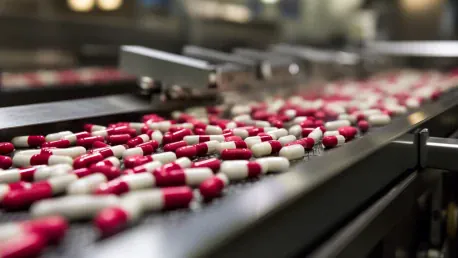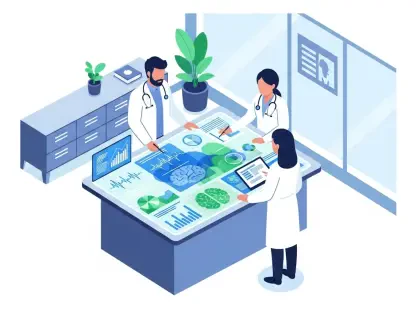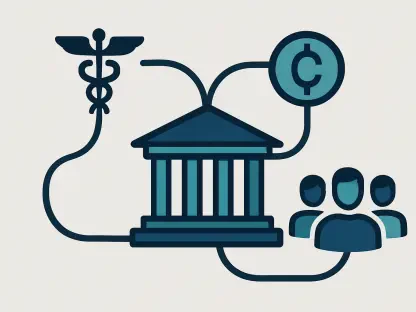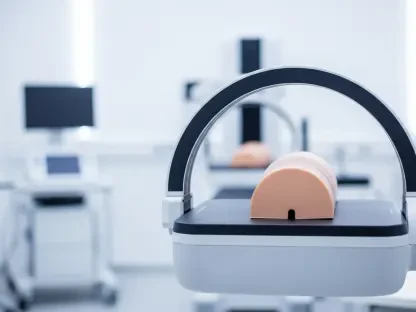Eli Lilly is making a bold move to shape the future of pharmaceutical manufacturing with its $4.5 billion investment in the Lilly Medicine Foundry. This new facility, set to open in late 2027 in Lebanon, Indiana’s LEAP Research and Innovation District, is poised to redefine how the industry approaches drug production, emphasizing cutting-edge technology, flexibility, and sustainability.
A New Era in Drug Manufacturing
Innovation at the Core
Eli Lilly’s commitment to innovation is evident in the multifaceted approach of the Lilly Medicine Foundry. The facility aims to integrate advanced technology in both research and manufacturing processes to lower costs and minimize the environmental impact of drug production. This initiative is not just about creating new medications but about revolutionizing the processes behind their development and manufacture. By implementing state-of-the-art technology, the Foundry seeks to make drug production more efficient and cost-effective.
At its core, the Foundry is designed to serve a dual purpose. On one hand, it will facilitate the production of medicines specifically for clinical trials, ensuring that new drug candidates can be quickly and safely brought to market. On the other hand, it will act as a research hub, focused on developing new manufacturing methods that can be scaled and transferred to other production sites globally. This balance between immediate application and future-looking research underscores Eli Lilly’s strategic intent to lead the industry in both innovation and practical execution.
Flexibility and Adaptability
The design of the Foundry reflects an emphasis on flexibility, accommodating a broad spectrum of medicines including traditional small-molecule drugs, biologics, and nucleic acid therapies. This adaptability ensures that Eli Lilly can remain at the forefront of the industry’s evolving needs, ready to tackle emerging scientific challenges and opportunities swiftly. The facility’s infrastructure is planned with versatility in mind, making it capable of pivoting to new types of therapeutic modalities as they are developed.
In addition to this inherent flexibility, the Foundry’s advanced production systems are designed to be environmentally friendly. By focusing on sustainable practices, Eli Lilly is addressing the pharmaceutical industry’s growing responsibility to reduce its ecological footprint. These efforts align with broader societal shifts towards sustainability, demonstrating that the company is responsive not only to industry trends but also to global environmental imperatives.
Strategic Investments and Collaborations
Building on Historical Success
Eli Lilly’s strategic investments are a testament to their dedication to advancing pharmaceutical science. The $4.5 billion Foundry builds on previous investments, such as the $700 million genetic medicine institute in Boston. These initiatives highlight Lilly’s proactive approach in pushing the boundaries of medical research and production capabilities. By continually investing substantial resources, Lilly aims to stay at the cutting edge of science and technology, ensuring that their capabilities evolve along with the scientific landscape.
This focus on genetic medicine is particularly noteworthy. By enhancing their infrastructure for both traditional and genetic-based therapies, Eli Lilly strengthens its position across multiple fronts. The Boston institute, announced in 2022, is specifically geared towards genetic research and highlights the company’s intent to delve deeper into groundbreaking science. These strategic investments collectively emphasize Lilly’s holistic approach to medicine, combining their historical strengths with new avenues for growth.
Partnerships with Biotech Innovators
Collaborations with RNA-focused companies like Avidity Biosciences, ProQR Therapeutics, QurAlis, and Dicerna further showcase Lilly’s strategy. By partnering with cutting-edge biotech firms, Eli Lilly leverages external expertise to enhance their research and development efforts, ensuring they remain leaders in the next wave of medical advancements. These partnerships provide Lilly with access to specialized knowledge and innovative approaches that complement their internal capabilities.
Moreover, these collaborations reflect a broader industry trend towards open innovation. By working closely with other biotech entities, Eli Lilly can more quickly and effectively bring new therapies to market. This approach not only accelerates timelines but also diversifies the sources of innovation, making the company more resilient and adaptive. By integrating external expertise with their robust internal R&D infrastructure, Lilly positions itself at the nexus of innovation within the pharmaceutical industry.
Impact on Domestic Biotechnology Manufacturing
Strengthening the U.S. Biotech Sector
U.S. Commerce Secretary Gina Raimondo has praised Eli Lilly’s efforts, emphasizing the importance of strengthening domestic biotechnology manufacturing. With recent legislative measures and executive orders aimed at bolstering U.S. biotech capabilities, Lilly’s investments align with national interests, supporting economic growth and technological leadership. This alignment underscores the strategic importance of Lilly’s investments not just for the company but for the broader U.S. bioeconomy.
These initiatives also have significant economic implications. By expanding their manufacturing footprint in the United States, Eli Lilly is creating high-quality jobs and fostering innovation within domestic borders. This move is particularly timely given the current geopolitical climate, which increasingly emphasizes the importance of national self-sufficiency in critical industries. Lilly’s investments serve as a model for how private enterprise can contribute to national strategic objectives, enhancing the resilience and competitiveness of the U.S. biotech sector.
Meeting Future Challenges
The Foundry and other investments signify Lilly’s readiness to meet future challenges and capitalize on opportunities within the global pharmaceutical landscape. Their focus on developing scalable and environmentally-friendly manufacturing solutions positions them to lead in an era where sustainability and cost-effectiveness are paramount. The dual focus on reducing costs and minimizing environmental impact reflects a comprehensive approach to modern drug manufacturing.
Eli Lilly’s strategic emphasis on scalability is particularly noteworthy. By developing manufacturing methods that can easily be ramped up or down, the company ensures that it can respond swiftly to fluctuations in market demand. This operational agility is crucial in an industry where the ability to pivot quickly can be a significant competitive advantage. Additionally, by prioritizing environmentally-friendly practices, Lilly is setting a new standard for sustainable drug manufacturing, which is increasingly important in a world facing urgent environmental challenges.
Commitment to Next-Generation Medicines
Addressing Critical Health Needs
Eli Lilly’s ongoing investments also reflect their commitment to addressing critical health needs, specifically in areas like diabetes and obesity. The latest $5.3 billion investment to expand production capacity for these medications is part of a broader strategy to ensure the availability of effective treatments for widespread health issues. This focus on critical health needs demonstrates Lilly’s intent to make a tangible impact on public health through its strategic investments.
These investments are not just about expanding production but also about enhancing the efficacy and accessibility of treatments. By increasing their capacity to produce life-saving medications, Lilly is ensuring that more patients can benefit from their advances. This proactive approach to scaling production capabilities aligns with the company’s broader mission to improve the quality of life for patients worldwide. It also underpins their commitment to being a responsible corporate citizen, addressing societal health challenges with robust, effective solutions.
Expanding Research Horizons
The Foundry’s role as a research hub for new manufacturing methods indicates Lilly’s intent to continually expand their horizons. By exploring novel approaches and technologies, they aim to streamline production processes, reduce costs, and minimize environmental impacts without compromising the efficacy and safety of new drugs. This focus on continuous improvement and innovation is a cornerstone of Lilly’s long-term strategic vision.
By prioritizing research and development, Eli Lilly demonstrates its commitment to staying at the forefront of pharmaceutical science. The Foundry’s research initiatives are expected to yield new insights and techniques that can be applied across the company’s global operations, enhancing overall efficiency and effectiveness. This relentless pursuit of innovation is what distinguishes Lilly in the highly competitive pharmaceutical landscape, ensuring that they remain leaders in both scientific discovery and practical application.
Positioning for Long-Term Success
A Visionary Approach
Eli Lilly’s unveiling of the Lilly Medicine Foundry is a clear statement of their visionary approach. The facility is designed not only for immediate impact but for long-term success in the pharmaceutical industry. Its flexible, state-of-the-art design ensures that Lilly can adapt to and lead industry changes, setting a precedent for future manufacturing facilities. This forward-thinking approach underscores the company’s commitment to being a pacesetter in the industry.
Moreover, the Foundry’s design and operational framework are intended to be a model for how future facilities can be built and managed. By integrating flexibility and advanced technology, Lilly is creating a blueprint for the next generation of pharmaceutical manufacturing plants. This visionary approach is expected to yield long-term benefits, ensuring that the company remains competitive and capable of meeting the industry’s evolving needs.
Aligning with Political and Economic Objectives
Eli Lilly is taking a groundbreaking step forward in the field of pharmaceutical manufacturing with its substantial $4.5 billion investment in the Lilly Medicine Foundry. This pioneering facility is slated to open in late 2027 and will be situated in Lebanon, Indiana’s LEAP Research and Innovation District. The establishment of the Lilly Medicine Foundry is set to revolutionize the pharmaceutical industry by implementing state-of-the-art technology, emphasizing flexibility, and prioritizing sustainability in drug production processes. The goal is to create a highly adaptive and efficient manufacturing environment that can quickly respond to advancements in medical science and changes in market demand.
By incorporating advanced machinery and innovative production techniques, the Lilly Medicine Foundry aims to enhance the efficacy and safety of drugs while reducing production costs and environmental impact. This facility is expected to serve as a blueprint for future pharmaceutical manufacturing plants, highlighting a commitment to innovation and sustainability. Eli Lilly’s investment showcases their dedication to staying at the forefront of the industry and their vision for a more sustainable and technologically advanced future in drug manufacturing.









